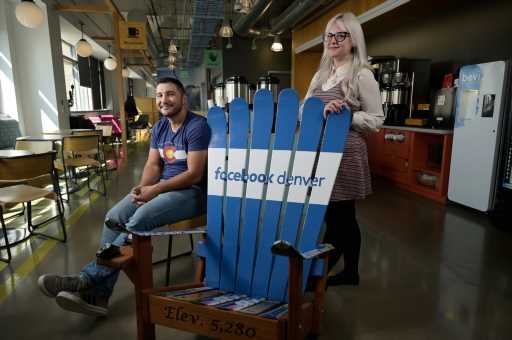Facebook, WhatsApp, Instagram and the other brands that operate under the Meta Platforms umbrella are known for helping people connect socially.
But connecting people on social networks requires a reliable physical network that can move vast amounts of information along fiber-optic lines and through data centers. Since November 2018, the team that controls the physical infrastructure linking billions of people worldwide has worked out of an office in lower downtown Denver at 1900 16th St., west of where the Mall shuttle terminates.
The heart and brains of Meta and Facebook remain at its headquarters in Menlo Park in Silicon Valley. But the spine that links the people who are connecting on Meta Platforms is controlled in Denver.
“There are 3 billion people on the system,” said Steve Politis, director of network planning and head of Meta’s Denver office. “No single vendor can sustain that.”
Meta chose to build its own network, Politis said, because “we don’t like to be surprised.” And it chose Denver because of the network expertise here.
Qwest Communications, Level 3 Communications, and the Zayo Group, along with other Colorado companies, helped build and manage fiber optic networks around the globe. Politis, a Colorado School of Mines graduate, cut his teeth at Level 3, gaining the skills he now uses at Meta.
A good share of Meta’s Denver employees are graduates of the University of Colorado Boulder fiber optics and network engineering programs. Other draws for Meta to Denver were the weather, the outdoor lifestyle and transit routes into downtown, including out to the airport, which in turn has flights connecting with cities across the country.
“Denver is a super attractive place,” Politis said. “You have a big draw of people who want to work here.”
Although the Denver office is smaller than many of Meta’s other locations — more than 100 people — its look and design mimic others within the company and for that matter, most major big tech companies.
Signs with Meta mottos line one wall in the lobby — “Doubt your Doubts,” “Be the Nerd,” “We Carry Each Other” and “They Tried to Bury Us. They Didn’t Know We Were Seeds.” A fully stocked break room with free snacks and numerous drink items, including taps offering kombucha and iced coffee. There’s a cafeteria with a kitchen for those who want a more substantial meal.
Politis said a reason for offering the perk is to improve efficiency. Employees don’t lose time walking the streets of downtown or waiting in long restaurant lines. Providing common areas where people can gather and share a drink or a meal allows for mingling, helps with collaboration, and provides a way to connect.
Employees who need a break can escape to a room with a Playstation or take someone on in a game of foosball or ping pong. A vending machine offers tech gear, cords, batteries and even COVID-19 tests.
“We have a laid-back culture among the people based here and a robust remote culture,” said Ashley Baker, site lead of the Denver office.
The Denver office has become popular with employees throughout Meta’s network, so much so that on any given day 30% to 40% of workers in Denver are from somewhere else. About three-quarters of Meta work teams are distributed or spread out, and when they do come together, say for training, Denver is a favorite gathering spot, Politis said.
“We make sure it feels like a Meta location,” he said. The concrete floors and exposed ductwork are similar, and touch terminals help workers navigate the space and get to where they need to go. And there are terminals that can securely connect to anyone within the company.
For years, the Front Range, especially Boulder County, served as a launching pad for innovative technology companies. When successful, those ventures were often swallowed up by larger competitors and relocated to Silicon Valley or other tech hubs. But about six dozen of the country’s largest technology companies and platforms have operations in Denver, according to Access Ventures, a local venture capital firm.
Besides Meta, that list includes giants like Microsoft, Google, Amazon, Intel, Apple and NVIDIA, as well as smaller but well-known brands like Twitter, Zoom, Robinhood, Uber, Lyft, Gusto and Workday. Some, like Palantir, a software developer working with government agencies and law enforcement, have relocated their headquarters here.
Facebook, which rebranded as Meta nearly a year ago, has kept a lower profile in Denver. But it is doing more to boost its local presence and community involvement, donating more than 500 backpacks to schoolchildren in need and providing $100,000 each to the Boulder County Wildfire Fund and the Center for Disaster Philanthropy and Community Foundation to support victims of the Marshall fire.
The relocation or creation of all those tech jobs, typically high paying, has supported the Front Range real estate market and economic growth in the state. But a major retrenchment is underway in the tech sector.
After years of unabated hiring, Meta CEO Mark Zuckerberg this summer, citing a weakening economy, announced the first-ever reduction of headcount. One office in New York is shutting down. Insider reports that Meta may try to shrink its workforce by 15% or 12,000 positions.
Digital ad revenues account for 97% of the company’s revenues and those are expected to soften in a recession. The company is also transitioning more of its focus to the Metaverse, a computer-generated space or virtual world where participants can interact with each other.
“Teams are going to shrink so we can shift energy to other areas inside the company,” Zuckerberg told analysts.
Source: Read Full Article

